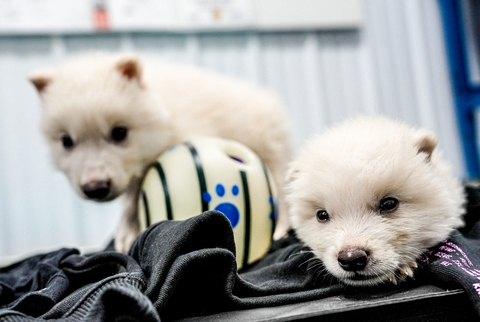Forget the Game of Thrones CGI because dire wolves are back… sort of.
The extinct species has resurfaced with the help of a company called Colossal Biosciences, a biology research company based in North Texas.
On Monday, the company, which describes itself as the “world’s only de-extinction company,” announced the rebirth of the once-extinct dire wolf. The Texas-based bioengineering company used DNA extracted from two fossils as well as 20 edits of the genetic code of a grey wolf — similar to a technique used in the movie Jurassic Park, where dinosaurs are brought back to life by using frog DNA to fill in genetic gaps — to bring the species out of extinction.
The dire wolf, made famous by George R. R. Martin’s Game of Thrones, had previously been extinct for more than 12,500 years. In a press release, the company revealed the successful birth of three dire wolves, sharing the major milestone and celebrating the world’s first successfully “de-extincted” animal.
The three dire wolves are two adolescent males named Romulus and Remus and one female puppy, named Khaleesi, in an homage to the Game of Thrones character played by Emilia Clarke.

Picture of Colossal’s dire wolves; Romulus and Remus at age one months, born on Oct. 1, 2024.
Colossal Biosciences
“I could not be more proud of the team. This massive milestone is the first of many coming examples demonstrating that our end-to-end de-extinction technology stack works,” Colossal CEO Ben Lamm said in a statement.
“Our team took DNA from a 13,000 year old tooth and a 72,000 year old skull and made healthy dire wolf puppies. It was once said, ‘any sufficiently advanced technology is indistinguishable from magic.’ Today, our team gets to unveil some of the magic they are working on and its broader impact on conservation.”
Romulus, Remus and Khaleesi are being raised in an undisclosed nature preserve and Colossal has 10 full-time animal care staff to support the wolves’ physical and mental well-being.
The preserve where the trio lives is on 2,000-plus acres enclosed by 10-foot-tall, zoo-grade fencing with redundant perimeter security. The wolves are monitored through on-site live camera, security personnel and drone tracking to ensure their safety and welfare.
The preserve also includes a smaller, six-acre secure site where the dire wolves can be further tended to and studied. The smaller area also supports an on-site veterinary clinic, a wolf management facility, an outdoor storm shelter and natural-built dens for the wolves.
The conservation property will provide lifetime care, feeding and protection for the wolves as Colossal plans to restore the species in secure and expansive ecological preserves, potentially on Indigenous land.
“The de-extinction of the dire wolf is more than a biological revival. Its birth symbolizes a reawakening – a return of an ancient spirit to the world. The dire wolf carries the echoes of our ancestors, their wisdom, and their connection to the wild,” MHA Nation Tribal Chairman Mark Fox said. “Its presence would remind us of our responsibility as stewards of the Earth – to protect not just the wolf, but the delicate balance of life itself.
“The work of the team at Colossal Biosciences is not only significant to our lands and people, but for conservation efforts across the globe. The ability for technological innovation to bring forth something so culturally and spiritually significant to indigenous people is paralleled by the far reaching impacts that this technology provides for the future of stewardship on our planet in species diversity and conservation.”
Filmmaker Peter Jackson and Game of Thrones creator Martin collaborated with Colossal for the reveal by lending the company the official 330-pound Iron Throne prop that was used to promote the hit series.
“Many people view dire wolves as mythical creatures that only exist in a fantasy world, but in reality, they have a rich history of contributing to the American ecosystem,” Martin said in a statement. “I get the luxury to write about magic, but Ben and Colossal have created magic by bringing these majestic beasts back to our world.”
— Elon Musk (@elonmusk) April 7, 2025
In March, the company announced that it had taken steps towards bringing back the woolly mammoth with the creation of the Colossal woolly mouse.
The “woolly mouse” is a genetically engineered rodent with key mammoth-like traits.
Since 2021, Colossal has been working on a plan to revive the woolly mammoth and later the dodo bird. To do this, the company has focused on identifying key traits of extinct animals by studying ancient DNA, intending to genetically engineer them into living animals.
Colossal said it focused on mice first to confirm whether the process works before potentially moving on to edit the embryos of Asian elephants, the closest living relatives to woolly mammoths.
— With files from Global News’ Katie Dangerfield
